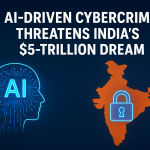As India accelerates toward its ambitious goal of becoming a $5-trillion economy, a new and powerful challenge has emerged — the rise of AI-driven cybercrime. While artificial intelligence has revolutionized industries, boosted productivity, and transformed digital ecosystems, it is now being exploited by cybercriminals in increasingly sophisticated ways, posing a significant threat to India’s economic security.
⚙️ The Double-Edged Sword of Artificial Intelligence
Artificial Intelligence (AI) has become a cornerstone of India’s digital transformation — from financial automation to smart governance and e-commerce. However, the same technology is now being repurposed by threat actors for malicious activities such as:
Deepfake scams targeting individuals and organizations.
AI-generated phishing campaigns that mimic human language and trusted brands.
Automated hacking tools capable of breaching systems faster than traditional methods.
Data manipulation and voice cloning used in financial frauds and identity theft.
These attacks are more difficult to detect because they evolve faster than existing cybersecurity defenses.
💻 Growing Cyber Threat Landscape
India has witnessed a 300% increase in cyber incidents over the past few years, according to government and private cybersecurity reports. In 2025, experts have flagged a surge in AI-enabled cyberattacks targeting:
Banks and fintech firms, leading to large-scale data breaches.
E-commerce and digital payments platforms, where AI bots exploit transaction loopholes.
Government and critical infrastructure, such as energy and healthcare networks.
With nearly 1 billion internet users and one of the world’s fastest-growing digital economies, India’s vast online population offers both opportunity and vulnerability.
🏦 Economic Implications
Cybercrime powered by AI doesn’t just cause financial loss — it erodes investor confidence, disrupts trade, and undermines the trust that fuels digital adoption. The World Economic Forum estimates that global cybercrime could cost the world over $10 trillion annually by 2025, with emerging economies like India among the hardest hit.
A single large-scale breach can cripple business operations, compromise sensitive data, and set back digital progress by years.
🔒 Strengthening India’s Cyber Defenses
To protect its digital economy, India must adopt a multi-layered strategy:
AI-for-AI Defense: Using artificial intelligence itself to predict, detect, and neutralize AI-based threats in real time.
Cybersecurity Education: Training employees and citizens to identify phishing, deepfakes, and digital frauds.
Stricter Regulation: Implementing data-protection laws and enforcing compliance among organizations.
Public-Private Collaboration: Encouraging partnerships between government bodies and cybersecurity startups for advanced threat intelligence.
Investment in Cyber Infrastructure: Building secure digital ecosystems that balance innovation with safety.
🌐 The Road Ahead
India’s dream of becoming a $5-trillion economy relies heavily on trust in its digital systems. As AI continues to shape the future, the nation’s success will depend not just on adopting technology, but on safeguarding it. The fight against AI-driven cybercrime is no longer optional — it’s essential for sustaining growth, innovation, and global credibility.
Related posts:
Discover trusted wedding venues and verified vendors on WeddSmart.com. Plan smarter, compare options, and create unforgettable celebrations with ease.
China and the U.S. achieved a preliminary consensus during Kuala Lumpur talks, addressing tariffs, export controls, and fentanyl regulation to ease trade tensions.


 AI-Driven Cybercrime Threatens India’s $5-Trillion Dream
AI-Driven Cybercrime Threatens India’s $5-Trillion Dream
 How to Find the Perfect Wedding or Event Venues & Vendors on WeddSmart.com
How to Find the Perfect Wedding or Event Venues & Vendors on WeddSmart.com
 China and U.S. Reach Preliminary Consensus in Kuala Lumpur Trade Talks
China and U.S. Reach Preliminary Consensus in Kuala Lumpur Trade Talks
 Twin Cyclones Brewing Over Indian Seas: “Cyclone Montha” Likely to Form Soon
Twin Cyclones Brewing Over Indian Seas: “Cyclone Montha” Likely to Form Soon
 Brazilian Vice President Arrives in India for Three-Day Official Visit
Brazilian Vice President Arrives in India for Three-Day Official Visit